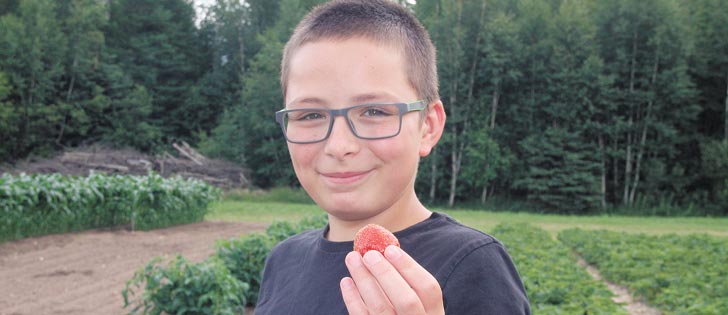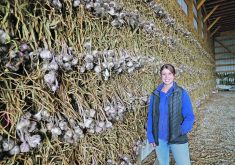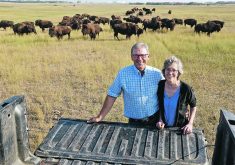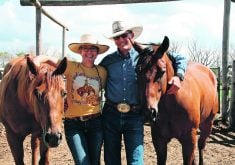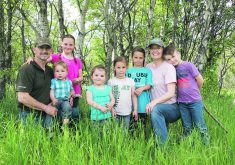Operation still learning which strawberry varieties are best suited to the area and how to water to prevent mould
PINE RIVER, Man. — Life is good on the farm for 11-year-old Levi Williamason. A swimming pool, trampoline, all-terrain vehicle, horses, chickens and rows of sweet strawberries fill his farmyard.
He has easy access to his maternal grandparents across the cow pasture, target practice with his bow and arrow and fishing with his dad on Pine River.
His parents, Jodi and Oggy, operate a U-pick and custom pick strawberry operation and sawmill and raise chickens for local consumers.
“It’s all right, as long as I don’t have to work too hard,” said Levi of farm work.
Read Also

Sustainable food has ‘lost all meaning’: prof
That marketing strategy is deader than a doornail, says a University of Guelph professor who specializes in consumer preferences and perceptions of agriculture and food.
Jodi said Levi has picked as many as five pails of strawberries in a day, but most of the fieldwork falls to her.
Oggy, who spends his winters away logging, processes wood to heat the family home and to sell to local consumers and his father-in-law’s sawmill.
“To make something like that pay off, you try to do different things,” said Oggy.
There is significant bush and occasional wildlife encounters in their area, but Jodi can manage when Oggy is gone, having recently put down a bear eating their chickens.
The couple’s goal is to expand gradually with little or no debt, but it’s difficult to be small when businesses and suppliers cater to large-scale operations.
“We have a long ways to go before we’re small,” quipped Levi about their modest operation.
Their customers come from many miles to pick strawberries, and the Williamsons often deliver fruit into Dauphin. Membership in the Prairie Fruit Growers Association gets their name on the group’s website and enables them to buy plants at discounted prices.
The Williamsons decided to grow strawberries after finding an abundance of wild ones on the quarter section of land they bought from Jodi’s parents. Neighbours leaving the business offered them their plants to help them get started.
Oggy suggested Thysyldo as a farm name after painstaking hours clearing bush, building the road in and setting up the house trailer.
“We would often find ourselves saying, ‘this’ll do,’ and so it’s a name that’s stuck. Things may not be perfect, but they’ll do,” said Jodi.
She gained valuable work experience and mentorship as a labourer at Prairie Dome near Yorkton, Sask.
They have had financial and other setbacks since startup, including the demise of 2,000 strawberry plants.
“Some other strawberry farmers we talked to said we put too much fertilizer too close to the plants. We applied it by hand, and I think that was the whole problem. We burned them,” said Jodi.
“This year, we used the same fertilizer again in a much lesser amount and all is well.”
Jodi cheerfully takes it all in stride.
“We had to view it as how it had to be,” said Jodi, a Mennonite who grew up in Steinbach, Man.
Levi attends a Mennonite school in Pine River, and Jodi continues to attend church and wear the traditional attire and head dress despite her departure from the group. She dons pants for safety and practical reasons when working at her father’s nearby sawmill and on her farm.
The family is still tweaking their operation and learning what works best for growing produce on their sandy soil.
“Strawberries do good in sandy soil, but weeds not so much,” Oggy said. “It’s trial and error, and hopefully we don’t make too many more errors.”
The Williamsons use minimal amounts of chemicals, spraying the blossoms to deter fruit malformation.
They limit the use of their current sprinkler system, which can cause mould to form on the plants.
“We prefer drip irrigation because it goes straight to the berries, there’s no weeds in the rows and it’s not wasting water because we have to haul (our water),” Jodi said.
Their newly planted field has gravity fed drip irrigation from a water tank. The downside is that algae in the water can plug the holes of irrigation strips.
They have 1,000 plants for picking and have planted the same amount again for next year, switching to Kent from Glooscap to reduce the amount of foliage.
“It’s too hard for people to find the berries,” said Jodi.



